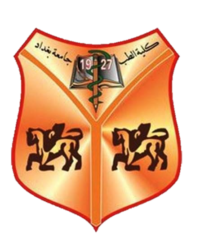Curriculum Description
This course description provides a necessary summary of the most important characteristics of the course and the expected learning outcomes for the student to achieve evidence of whether he made the most of the available learning opportunities. It must be linked to a description of the program.
General Description
| Category | Details |
|---|---|
| Name of Organization: | Baghdad College of Medicine |
| Department: | Microbiology and Medicine Departments |
| Module Name: | Immune Disturbance |
| Course Pattern: | Large group lectures, and small group lectures |
| Semester and Year: | 3rd Year / Semester 2 |
| Total Course Hours: | 22 theory hours, 12 practical hours |
Goal of the Course
- To know the classification and presentation of immunodeficiency problems, and evaluation of the immune status.
- Definition of acute and chronic inflammation; symptoms and signs of inflammation and diagnosis using proper serology and laboratory tests.
- Listing predisposing factors to autoimmune diseases and their classification and diagnosis.
- Describing conditions for allergy and its risk factors, its pathology and clinical features.
- Characterization of the main clinical features and immunopathological mechanism of connective tissue diseases (including Systemic lupus erythematosus and Rheumatoid arthritis) and organ specific autoimmune diseases like autoimmune thyroiditis.
- Diagnosis and management of anaphylaxis.
- Description and classification of organ rejection and complications that arise from immunosuppression.
Outcome of this Module
A. Cognitive and Theoretical Goals:
- To get enough knowledge about autoimmune and allergic diseases.
- To know their clinical diagnosis.
B. Skills:
- Knowledge and interpretation of relevant lab results including serology.
Methods of Learning
- Small group lectures.
Methods of Assessment
- Formative and summative exams.
C. Values and Sentimental Goals:
- Learning medical ethics.
- To work within a team.
D. General and Qualifying Skills (Other Skills Related to Employability and Personal Development):
- To diagnose immunity diseases and interpreting lab results.
Infrastructure
| Week | Hours | Topics | Learning Outcomes | Assessment Methods | Teaching Methods |
|---|---|---|---|---|---|
| Semester 2 (13 weeks) | 22 large group lectures, 12 lab and small group lectures | Allergic diseases/asthma Immune diseases Second: Organ transplantation Principles of transplantation Organs/diseases Autoimmune Immunotherapy/Immunovaccination Immune deficiency Immunotumor evaluation Clinical patients Immune deficiency | Mentioned | Formative exams on INLE website, end semester exam, quizzes, end summative exam, end practical exam | Large group lectures and small group lectures |
Course Books Required
- Jawetz, Melnick, & Adelberg's . Medical Microbiology. (Twenty-Sixth Edition). LANGE medical book
Main References (Sources)
- WHO/ CDC/MEDSCAPE
Recommended Resources
- INLE Iraqi network learning environment

